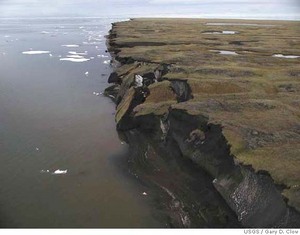
|
| ©USGS/Gary D. Clow |
| A cliff collapses into the Beaufort Sea on Alaska's north coast, as the permafrost melts and no longer holds that earth solid. |
Using evidence from satellite observations and aerial photographs, two geologists at the U.S. Geological Survey have concluded that pack ice shrinking rapidly over the Beaufort Sea has probably caused the waves to surge more powerfully against the weakened cliffs.



